“Hello Celes! I read your talent article and have a question. I mean, when I listen to voices like Whitney Houston, Mariah Carey and Christina Aguilera, they must have an innate gift. Why are there are no other singers like them? I don’t know what to believe about talent, if it really does exist.
I feel ‘talentless’ and discouraged in some way. Because I want to be REALLY good at anything I want, but innate talent is unfair. I don’t have that.” — Sarah
Hey Sarah, it is true that some people have a higher propensity for something over others. Some people may have a natural talent in singing, some in drawing, and others in writing. Different people seem to have inclinations towards certain crafts and mediums, there’s no doubt about that.
People with Undeniable Talents, Probably Since Young
For example, I’m not a particular fan (or hater) of Justin Bieber, but watching a clip of him playing drums when he was 13 years old, it’s undeniable that he had rhythm at a young age. Bieber taught himself musical instruments such as piano, drums, guitar, and trumpet growing up and as we know, he’s incredibly successful today.
We have Mariah Carey who, like you said, has an astounding voice. She has a five-octave vocal range and is able to reach notes beyond the seventh octave. She is coined the “songbird supreme” by the Guinness World Records and was placed second in Cove magazine’s list of “The 100 Outstanding Pop Vocalists.” She was easily one of the best singers in the world during the peak of her career.
Then looking at acting, there are some actors who are simply better at what they do than others. There’s Robert Downey Jr., Johnny Depp, Leonardo DiCaprio, Robin Williams, Anthony Hopkins, and Morgan Freeman, actors who bring whatever characters they are acting to life.
Actresses-wise, we have Meryl Streep, Nicole Kidman, Drew Barrymore, and Jennifer Lawrence (2012 Academy Award Best Actress winner for her role in romantic comedy Silver Linings Playbook) who have an immaculate touch to their character portrayals. Lawrence has been hailed “the most talented young actress in America” by Rolling Stone for her spot-on performances to date.
Yet…
That said, there’s hardly merit in being disgruntled with innate talent.
Helen Keller: Blind and Deaf Since Young
For example, if we really want to talk about what’s fair or unfair, it’s hardly fair that Helen Keller, iconic author and political activist, had her sense of sight and hearing robbed from her from birth, due to a childhood illness she had no control over. As a girl, she never got to experience for herself a world with colors or sound. She continued living this way till her death at the age of 87. On the other hand, most of us here are able to see and hear to some fair degree. We were born this way and we didn’t exactly do anything to “deserve” this; these privileges were simply given to us at birth.
Wilma Rudolph: Paralyzed as a Child
Then there’s Olympic champion Wilma Rudolph (1940–1994), who — at the age of four — was paralyzed after being hit by infantile paralysis (among other deadly illnesses fever such as double pneumonia and scarlet fever). The doctors told Wilma’s mom that she would never walk again, at least not like a normal child would.
But Wilma never gave up. She pressed on and struggled to walk with her steel brace, to the point where she could walk without her steel brace during her ninth birthday — amazing even her doctors! Subsequently, Wilma pushed her limits to the point where she could not only walk without a limp, but run: at the age of 16, she joined her high school track team and progressed from the girl who always limped into the last place at every race to the girl who won every single race she entered.
It wasn’t long before Wilma was selected to represent America in Olympics in three events: 100 m sprint, 200 m sprint, and 4 x 100 m relay. Believe it or not, in the 1960 Summer Olympics, Wilma became the first American woman in history to win three gold medals in track and field during a single Olympic Game — on a sprained ankle. She was thereafter hailed as “The Tornado, the fastest woman on earth”.
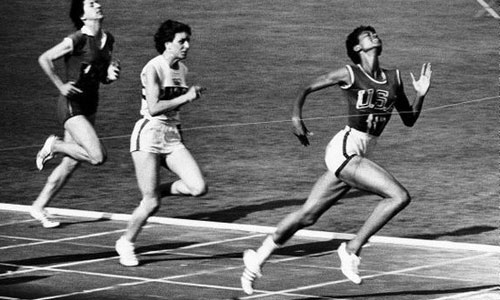
Wilma Rudolph winning the 100 m sprint in 1960 Olympics
And we’re talking about the girl who was paralyzed as a child, but somehow, through sheer grit, faith, and a touch of a miracle, regained her ability to walk, to the point where she could outrun even people who were born healthy without any disability.
Woman of the Year 2013
I was at Her World Woman of the Year 2013 event last week, and the Young Woman of the Year Achiever, Yeo Sze Ling, is blind. She was diagnosed with glaucoma at the age of four and lost her ability to see anything but just light. Clearly, it’s not fair at all.
Yet, Yeo did not let this disability stopped her from life as she proceeded to study in mainstream education, graduate top of her university faculty (Mathematics), and earn not one, not two, but three degrees, including a PhD in Mathematics, all by the age of 28.
Watching her on stage giving her thank-you speech, it’s obvious that she has risen above what most in the society would see as decimating condition: she is humorous, jovial, and able to make light of people’s awkward responses to her “disability” (including her own niece). She also makes a point to give back to others by translating books for other visually impaired students and tutoring students in her personal time.

Dr. Yeo Sze Ling, research scientist at A*STAR. She became blind at the age of four after being diagnosed with glaucoma.
I thought her story was inspiring. I don’t know who were the other nominees (it was a closed-doors selection process), but I can clearly see why she was given this award.
Nick Vujicic: A Man with No Limbs
Last but not least, there is Nick Vujicic, a man born with no hands nor legs — a rare disorder known as tetra-amelia syndrome. When he was born, his mother refused to see him or hold him immediately after his birth; instead, she and her husband left the hospital. It took them 3-4 months to come to terms with his condition.
Nick was bullied in school and fell into a severe depression. He tried to drown himself in his bathtub when he was ten (but thankfully was saved).

Nick later decided to embrace his condition and use his story to inspire others. He learned how to live a life without hands and legs: combing his hair, brushing his teeth, answering the phone, and shaving. He’s active in sports and participates in golf, swimming, soccer, and sky-diving. He even learned how to use the computer, typing up to 43 words a minute. He would become vice captain in his high school, and later graduated with a double-major degree at the age of 21.
Today, Nick is a world-renowned motivational speaker. He has visited over 57 countries, given over 3,000 talks, and some of which have attracted audiences with over 100,000 people.[1]
And he found love: he met his wife in 2010, got married in 2012, and they have four children today.[2] He spoke of finding love before he met his wife because he has faith and he believes in possibilities. I thought this quote of his is beautiful, “I want to talk about my wife. I’m not married. I don’t know who my wife is yet. Right? That’s okay. I know she’s coming. That’s fine. She’s coming.”
Nick was born in Australia but had it been a different country, he might have been killed at birth because people with disabilities are considered a curse in certain countries.
These People…
…all had obvious disadvantages since their early lives. While they likely felt that life was unfair at one point or other in their lives, they eventually chose not to let their supposed “shortcomings” bring them down. They instead worked hard to defeat the odds and rose above even fully-abled people in their respective fields.
Talent: a Grossly Credited Ability
I get why you may feel unfairness over supposedly not having any innate gift. It would be great to possess an innate talent of some sort, naturally excel in your craft without too much work, and easily sail on your road to success. It’s always nice to be deemed as some sort of child prodigy, gifted since young, and destined to succeed regardless of circumstances.
However, stories of that one man/woman who magically ups everyone by virtue of his/her talent alone are usually grossly simplified, heavily misrepresented, and unbelievably exaggerated.
As I’ve written in 10,000 Hours to Develop Talent, many super-achievers today have spent ten thousands of hours developing their skills despite widespread belief that their ability is purely innate.
Lady Gaga: Multi-talented Musician
Lady Gaga for example is a multi-talented singer and musician and also the best-selling female singer of our time with over 80 million records sold to date. The world only knew about Gaga in 2009, when her career started taking off with her “Just Dance” hit.
Yet, Gaga had spent nearly two decades honing her craft before receiving that career breakthrough. She started playing the piano when she was four, wrote her first piano ballad at the age of 13, constantly took up lead roles in high-school productions, and started performing at open mic nights at the age of 14. While she was constantly booed off stage in her early career, she never let that get her down, instead using them to fuel her tobecome better. Gaga would also enter a musical theater training conservatory at 17 to further her musical skills.
Gaga has been writing songs, singing, and playing music all her life LONG before she became famous. Most people just aren’t privy to the work that went on behind the scenes to get as good as she is. Even if she was born with a musical talent, it would have fallen flat without her endless hard work. The latter has clearly played a bigger role in shaping her success today than whatever talent she was born with.
Michael Jordan: World’s Greatest Basketball Player
Another example: Michael Jordan who is repeatedly acclaimed as the greatest basketball player of all time.
However, did you know that Michael was rejected from his varsity basketball team when he was 15? That the varsity coach found him too short to be placed there? (Jordan was 5′ 11″ or 1.80 m while the cutoff was 5″ 12′, or 1.82 m.) Also, while Michael could play, “his shooting was merely good and his defense mediocre” (to quote his high school coach).
Michael was instead placed in the junior-varsity team. Given that no one in the Jordan family history had ever reached over six feet, Michael had little reason to believe that he would ever get to play at the varsity level.
Michael then made it his goal to grow taller. He trained intensively, cut classes, and practiced basketball every day after school with his older brother Larry. He became the star of the junior varsity team, tallied several 40-point games, and grew four inches taller (that’s 10 cm), which then earned him a spot on the varsity team. This would only be the precursor to his legendary basketball career.
(Jordan later grew another three iches taller (7.5 cm), reaching his height today of 6′ 6″ or 1.98 m.)

Michael Jordan doing his signature slam dunk
Would it have mattered if Michael didn’t grow taller? No, actually I doubt so. Michael’s competitiveness was already evident in him as a kid: he refused to let anything stand in the way between him and the sport.
As his high school coach Clifton (Pop) Herring said in a Sports Illustrated feature,
If Jordan distinguished himself at all during the tryout, it was through his supreme effort. He was first in line for the conditioning drills, and he ran them as hard as anyone, and when they were over he wanted to run some more.
And to quote CBS Sports,
Jordan is the protagonist who never settled for anything short of the absolute best, using a roster decision (i.e. him being placed at the JV-level vs. varsity level at first) as the fuel to cast himself into a lifelong fantasy battle against a world of perceived doubters who were out to tear him down.”
(Check out inspiring Michael Jordan commercials in 20 Amazing Commercials To Inspire the Greatness in You.)
Craft Your Path and Develop Your Talent
My intention of sharing the above examples is not to undermine talent nor to ask you to duplicate Gaga’s or Jordan’s paths.
Not at all. I recognize that talent has merit. I also recognize that everyone is different and not everyone is going to be as dedicated as Gaga or Jordan in pursuing their craft and developing their skills in their passions (or, are you? :) ).
My intents are
- to point out that innate talent, whatever amounts we were born with (or not), isn’t something worth agonizing over. Not only is it not within our control, it’s also not as big of a determinant of success as you may think.
- to highlight that at the end of the day, hard work and persistence are still true-north methods to succeeding in life. (It almost felt from your letter that you were brushing away the role of hard work and simply resigning one’s life success to whether one was born with talent or not. I heavily disagree with that.)
Talent would play a big role in one’s life success: only if the person did absolutely nothing to build on it. But that would also mean the person would not get far too (if he/she was even going to succeed based on solely talent and no work to begin with). On the other hand, by pumping in endless hours of hard work in investing your craft, you reduce the role of talent from 100%, to 75%, to 50%, to 25%, to 10%, to 5%, to 1%, to 0.1%, to 0.01%, then eventually to the point where it has little irrelevance in your personal success.
Rather than compare yourself with people like Whitney Houston, Mariah Carey, or Christina Aguilera (who are all goddesses in their own right), why not craft your own path, be the best person you can be, and shine in your own light? Rather than lament over what others seem to have over you at birth or in life, why not be thankful for your life, your health, your working mind and your able body, and think about how to further yourself towards >your goals?
As Albert Einstein once said,
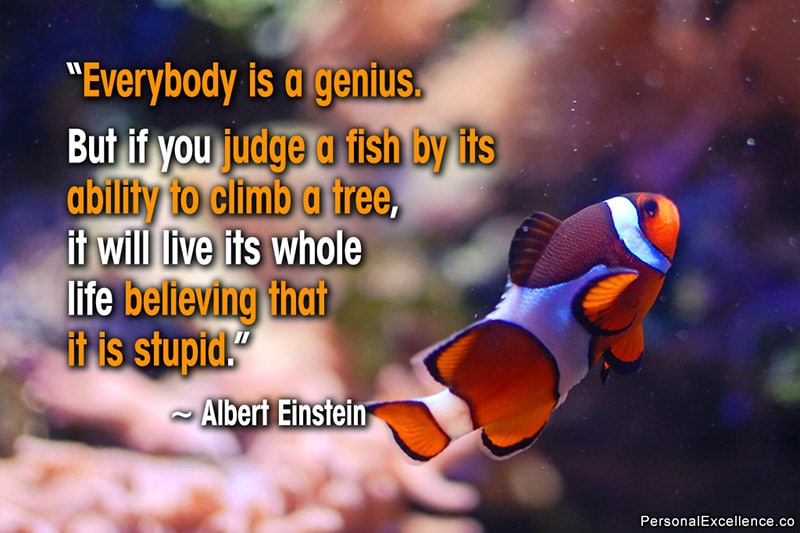
(Image: Personal Excellence; Image)
Think about what you love to do because while skill can be built in any area, but passion can’t. Think about the message you want to spread to the world, then craft your path to achieve that. Get better by developing your skills, leveling up, and putting in your 10,000 hours.
That’s what I have done for myself in the past five years when I started in a field completely different from what I studied in school (marketing). My writing, speaking, and coaching skills today have all been built through thousands of hours of in-field doing. Read my passion series on how to start pursuing your passion and turn it into a successful career.
Fellow PE reader Nini (who saw your question in one of my posts) puts it well in her reply to you there:
“Celestine has a quote that says “It takes 10,000 hours to develop talent. How many hours have you clocked today?”
If you are passionate about something and put your mind to it, you can work towards having that talent. From personal experience, I had a friend who was dreadful at writing and I was very good, an A student. After working with this friend for a while, they began to get BETTER than me and my ‘innate’ talent. Even if you have an innate talent, or don’t, you need practice to get better.”
Work on building your talent, because you already have it in you — it’s just a matter of bringing it out of you. :)

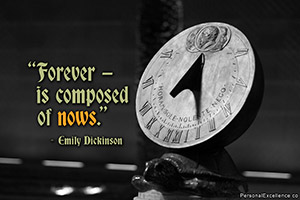
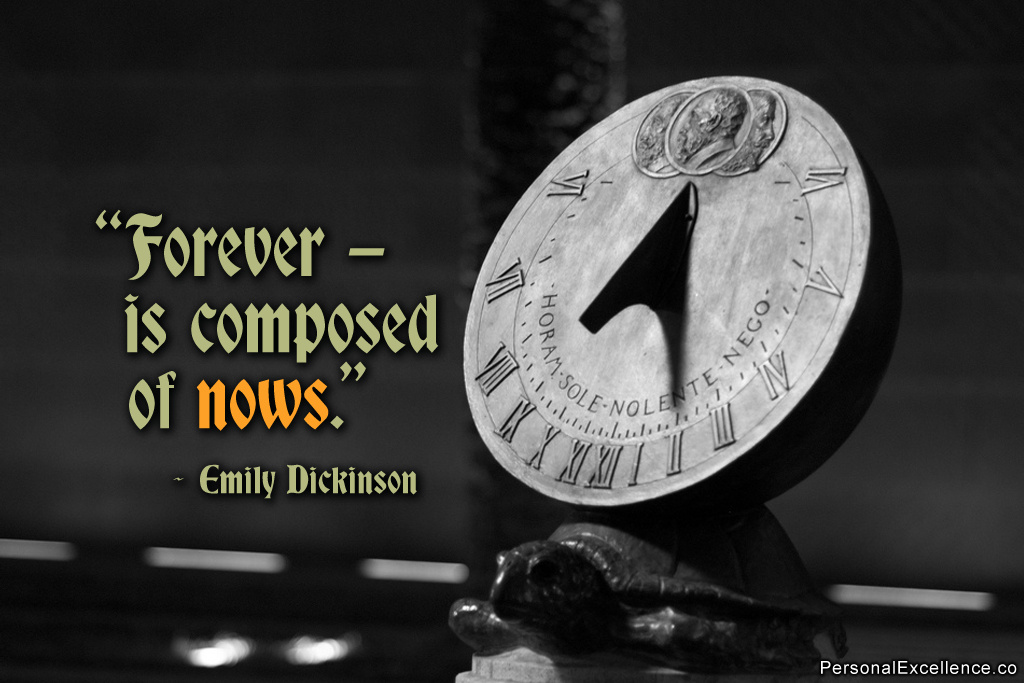


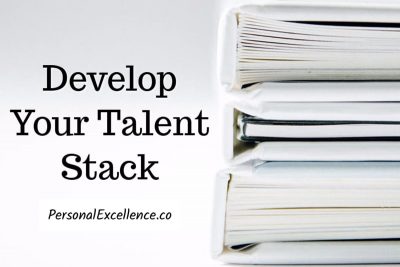
![Success Has No Age Limit [Infographic]](https://personalexcellence.co/files/infographic-success-no-age-limit-400x400.png)
 I hope you find my content helpful. Join my community of 65,000 readers and get my latest articles delivered to your inbox. Your email is safe and I never send spam.
I hope you find my content helpful. Join my community of 65,000 readers and get my latest articles delivered to your inbox. Your email is safe and I never send spam.
Celes, I LOVE YOU! I’m crying (tears of joy) writing this to you. I Thank GOD with all my heart and soul for my connecting to you. Of all the billions of people, trillions of articles, and information we have access to today (2015) GOD made it possible that I connected with you and your words! GOD knows my heart, my soul and my abilities. GOD pushed me to you and your words having giving me more Love and Inspiration that I never knew existed until just Now! I Thank You, from the bottom of my heart. But, my truest gratitude will be my becoming successful, making you proud, you helped one more overcome the dis-ease of non-achievement! THANK YOU, THANK YOU and I THANK GOD FOR YOU!
LOVE ALWAYS and FOREVER,
Tonia
Celes,
Thank you for going above and beyond to write this one. Your examples indeed “prove” that talent is not all there is to living a meaningful and richer life.
Pooja
Greetings from Serbia :)
Great article, but I’m afraid you might be missing part of the point. When people are irritated because so many others have innate talent. It’s not so much that they have innate talent, it’s that no matter what I do I can’t ever do what they can do even when putting in the time. I really want to be a flute player I’ve been playing the flute for several years I’d like to go to a music school and get a degree in music education. No music school will accept me. I’ve already applied several times. I practiced a lot more than my peers who had no trouble getting in. I shelled out all my money to a university professor for lessons. I left almost all of them feeling like crap she made me cry a couple times and basically told me I wasn’t getting in. My own Mom is telling me to quit, so is my best friend. No one ever bothers coming to any performance I’m in. I don’t have the talent, and no matter how much time or work I put in, no one wants to hear me play, and no, telling me all about how everyone else is so successful isn’t helpful. If I knew how to lock myself in a practice room long enough to magically play beautifully or at least more beautifully I’d be doing that, but nothing I do ever works, and its not because I’m lazy or I don’t care enough
Hi Celes, I have been reading your articles since a long time but this is the first time I am commenting. I believe that passion is something very natural and is the most important factor for success. Your handicap, your background, your ethnicity does not matter if you have it. As you said “…while skill can be built in any area, but passion can’t.” I have simple question: What if you don’t have passion to do anything or it just disappears in some days of pursuing something? It’s easy to say ‘Oh, but that was not your passion, you have to keep looking for it’ but what if I say that I have tried so many things which I really think it is my passion but things just don’t work after a week or so and I have to give up coz it is not coming from with in. I have sat down and written my list of goals 100s of time but in 10 days I loose the passion. I am ready to fight the world but what if there is no power from within. I will be happy to get a reply. Thank you.
Celes, I really enjoyed this post. I am a blind singer, poet, and college writing instructor, and I’ve often had others belittle my hard work. It is easier to label someone else a “prodigy” than to acknowledge the dedication and passion needed to fulfill your dreams. Regardless of abilities and opportunities, nothing beats passion!
Emily, your response is beautiful and moved me deeply: I even shared your response on my social media. Keep up the amazing work in what you are doing; don’t let others writing off your hard work deter you. People who try to sweep away your hard work simply don’t know the work it takes to get to where you are; it’s also why they aren’t there yet. The ones who are or who have tried would know that your success is more than meets the eye.
Wow – when we think we don’t have talent, we are blown out of the water by these amazing people. Everyone is amazing at something, you just have to find out what!
There’s also an element of luck. For instance, most pro athletes (for the “big” team sports) in North America are born in Jan-Feb-March, because when they’re young, the most talented kids are the oldest and get streamed into special programs.
Not to say you can’t develop talent! But it’s not ALL up to you.
I’m sure if someone is really passionate and persistent about getting into those teams, they’ll go beyond the mile and find ways to get streamed in spite of the circumstance. Michael Jordan is a great example; the other examples I’ve already listed in the post speak for themselves.
Luck is preparation met opportunity, and opportunity — depending on how much locus of control you take over your reality — can be created. So in the end luck is really something that you can create for yourself.
I don’t mean to dispute you on the point that passion and persistence can overcome circumstance – it’s undeniably the case.
And I hope I’m not coming off the wrong way because you wrote an incredibly well-researched inspiring article that demonstrates what we can accomplish despite the barriers that DO exist.
But if we want to reward persistence and passion – which I feel is a noble goal, I think it’s crucial that we become cognizant of inequalities inherent in society and work to remove them.
Here’s another example: I did not choose to be born a white male in a developed country into a middle class family. As a result I have an obscene amount of opportunity that other people don’t, and for me the barriers to “success” are lower.
This isn’t meant to be an opportunity for excuse-making in the face of an obstacle, but it’s probably worth knowing that if you’re a December baby, the odds are quite heavily stacked against you becoming a star athlete because you will have fewer of these “opportunities” irrespective of your work ethic.
(Sorry, In my initial response I meant “chance” not “luck” – subtle but important difference)
Hey AJ, I think we’re on the same page here. :) You bring up excellent points. I agree that inequalities in the society (be it due to situation/race/family’s socio-economic status etc.) should be something that all of us work to remove, and I believe it is something that’s happening already — even if not right away. There are definitely more opportunities erected for everyone today compared to 50, 100 years ago, and I believe the situation will get even better in the years forward.
In the meantime, with regards to unequal odds stacked against one’s favor due to circumstance (which can’t be removed for whatever social reasons in today’s world), it’s about finding ways to usurp that — assuming one is passionate about that the subject itself.
For example I’m sure there must have been unequal odds which I faced at some point in my life denying me the opportunity to pursue certain things, just that I never bothered to work against those odds because I didn’t care enough about those things. However had it been something I was really passionate in, I would have done everything necessary to beat those odds, however big they were.
(One example I can think of in the Singapore context is how singing and art-related careers tend to be frowned upon especially one-to-two decades ago because they are seen as unrealistic careers, so the social and economic fabric in the country is actually not conducive for cultivating singers. I personally don’t care about singing so I never did anything about these odds, but had I had a passion in this area I would have found a way to carve a career in this, say record myself singing covers, uploading videos on Youtube, building a following online, leading on to possible collaborations with other talents in the field, and so on.)
Hi Celes, what a beautiful response! I love how you went above and beyond answering this question, first compassionately addressing the reader’s feelings by acknowledging how talent varies, but then also offering tons of inspiration. This gives perspective to many of us when looking at the great strides made by those with great obstacles–a reminder to be grateful for what we do have and build on that. <3
It may be hard to identify what it is but I’d like to believe every person has *something* they love doing so much they could potentially excel at it.
Another difficulty is when you run into obstacles and start doubting whether this was really your “thing” to begin with. Whether to quit and try something else or keep going and hope to get back on track with more experience. At one point, you may be juggling 5 skills, be average at all of them but not know which one to focus on. Because you kind of like doing them all but none of them stands out as “yes, that’s the one!”
Such an inspiring read! Thanks for writing this Celes, I loved the examples of inspiring people you gave here as I hadn’t known of some of them before.
We all have our fair share of our talents and along that talent that we are blessed with is a passion to fuel that talent. Whether we successfully hone that talent depends on how much we believe in it and the passion we have for it. Those great people who dedicated themselves were/are naturally passionate about what their talents prompts them to do. We have got to be passionate about what we want to do.
Great examples of the greats!
Thanks for sharing these people’s stories. I finf them inspiring, especially the first 3. I’ve read about Nick Vujicic before but not Wilma Rudolph or Dr Yeo Sze Ling. I think sometimes we can get caught up in our own dramas and it’s hard to see past them, so we get really down.
Another inspiring person is Jessica Cox, who was born without arms but learnt to do things with her feet instead, including how to fly a plane. I saved this quote of hers when I read it last year: “So many people let fear get in the way of living life but I’m proof that you can accomplish anything you put your mind to.”
Thanks so much for sharing about Jessica Cox, Moonsparkle. I went to google her and she is definitely another inspiring figure. Links for those of you who are interested:
Her wiki profile: http://en.wikipedia.org/wiki/Jessica_Cox
BBC article (with video) of her piloting with her feet: http://www.bbc.co.uk/news/magazine-21377627
Turns out not only is she the world’s first licensed armless pilot, she is also the first armless black-belt in the American Taekwondo (and she now has two black belts!). And she is only 30, one year older than me! Simply amazing.
Your mention of Jessica Cox reminds me of this handicapped model, Kelly Knox. She was born without a left arm and refused to wear a prosthetic arm since the age of seven: and hence appears this way in all her pictures and modeling campaigns — looking absolutely gorgeous, left-armless and all. She is actually UK’s leading disabled model today. She is a refreshing change in the modeling industry which focuses so much on this one image of beauty and is very inspiring.
More on her:
Wiki: http://en.wikipedia.org/wiki/Kelly_Knox
Article on her: http://www.dailymail.co.uk/tvshowbiz/article-1039730/I-born-left-arm–I-modelling-contract.html
Her website: http://kellyknox.com/
You’re welcome. :) Thanks for sharing Kelly Knox’s story too. I know Britain’s Missing Top Model, so might have heard about her when she won but it was a few years ago. It’s inspiring to read her story. :)
Such an inspiring article ..
thank you for reminding us the key to success, the one anyone can have , “grit” ..
Indeed — what you said, Farnam! :)
Hey Celes, lovely article. So true, we should be grateful for what we have. Thanks for the reminder… :)
You’re very welcome Ipshita! :) We can always choose to focus on what isn’t there or what is there: the former will make us more miserable while the latter will help us live a life of abundance. Whether to think in the former or latter manner actually doesn’t have anything to do with the present condition of our lives (contrary to what many think), but simply a matter of picking the right attitude. It’s by having an abundant attitude that abundance (success, happiness, positive outcomes) will come our way, not the other way round.
Lovely, reminds me of the movie “Whisper of the Heart” when the old man tells the girl that talent is like a beautiful gem and raw talent is like a geode: It’s in there, but you have to cut and polish and cut and polish before it is a gem. When we compare the talents of famous people to our own, it’s like comparing that sparkling, finished gem, to the rocky and rough exterior of our geode.
I love that analogy, Laurel — totally agree with it!
Beautifully written !…Thank you for the new perspective to look at things and to know that everyone is fighting their own battles…its never easy!
What you said, Zoe! :) Sometimes we may think that we are alone in our struggles and have a “woe is me” attitude, but really, when we look out there, there are millions of people out there who are experiencing the same problem (if not worse) and we’re really having it better!
And also, obstacles are what make us — do we want our life to be defined by the obstacles which defeated us or us overcoming those obstacles? You decide!
Great post!
Thank you Cherene! :)
I think everyone has their own special talents.
Indeed!
Commenting for this post is closed.